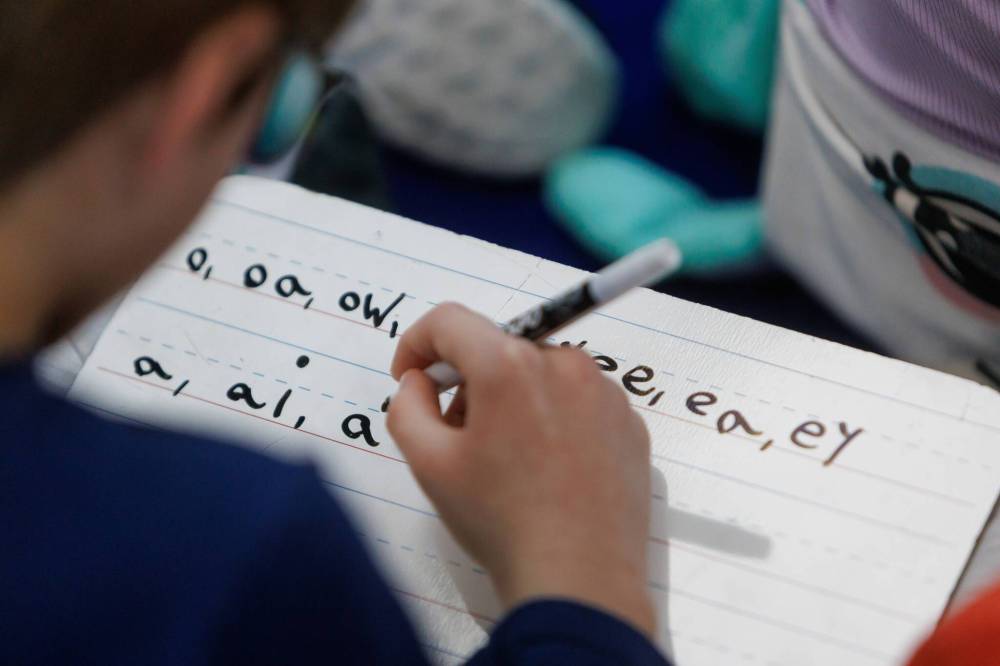Setting the record straight on Reading Recovery
Advertisement
Read this article for free:
or
Already have an account? Log in here »
To continue reading, please subscribe:
Monthly Digital Subscription
$1 per week for 24 weeks*
- Enjoy unlimited reading on winnipegfreepress.com
- Read the E-Edition, our digital replica newspaper
- Access News Break, our award-winning app
- Play interactive puzzles
*Billed as $4.00 plus GST every four weeks. After 24 weeks, price increases to the regular rate of $19.95 plus GST every four weeks. Offer available to new and qualified returning subscribers only. Cancel any time.
Monthly Digital Subscription
$4.99/week*
- Enjoy unlimited reading on winnipegfreepress.com
- Read the E-Edition, our digital replica newspaper
- Access News Break, our award-winning app
- Play interactive puzzles
*Billed as $19.95 plus GST every four weeks. Cancel any time.
To continue reading, please subscribe:
Add Free Press access to your Brandon Sun subscription for only an additional
$1 for the first 4 weeks*
*Your next subscription payment will increase by $1.00 and you will be charged $16.99 plus GST for four weeks. After four weeks, your payment will increase to $23.99 plus GST every four weeks.
Read unlimited articles for free today:
or
Already have an account? Log in here »
When I read the op-ed Empire of illiteracy in a recent Winnipeg Free Press (Think Tank, Sept. 9), I wasn’t just frustrated, I was deeply disappointed.
As an education professional, a non-profit leader, and most importantly, a parent of a child with dyslexia, I take the issue of literacy very personally.
That’s why it’s painful to see misinformation passed off as fact, especially when it misrepresents the interventions that help our most vulnerable students learn to read.

MIKE DEAL / FREE PRESs fileS
Different reading strategies have the same goal: teaching children to read.
Let me be clear: Reading Recovery is not a commercial program. It is a one-to-one early literacy intervention offered to trained teachers on a no-royalty basis.
The Reading Recovery Council of North America is a non-profit organization, not a publishing empire as the original author insinuated. Suggesting otherwise is simply untrue and both misleads readers who deserve better and spits in the face of RRCNA’s critical mission, ensuring a literate and productive future for children learning to read and write.
Even more concerning is the way the article misrepresented Reading Recovery’s effectiveness.
It tied our work to “three cueing” and labeled it “discredited.” That claim is flat-out wrong. Three cueing is not — and never has been — an instructional method. And to suggest that Reading Recovery harms children or causes psychological distress is not only false but insulting to the teachers and families who see children thrive in the program every day.
The research record is clear. The U.S. Department of Education’s What Works Clearinghouse has consistently validated Reading Recovery’s effectiveness, as has the Evidence for ESSA, the Every Student Succeeds Act.
The one negative study frequently cited by critics has been thoroughly debunked and excluded from legitimate reviews because of serious flaws.
Meanwhile, decades of peer-reviewed studies show the same thing: Reading Recovery works, and it works for the struggling readers and writers who need it most.
It was also frustrating to see the article imply financial motives or conflicts of interest.
The truth? Council’s board of directors is made up of unpaid volunteers — career educators and literacy leaders who give their time because they believe in helping children.
These are the voices that should be at the centre of conversations about literacy, not lobbyists and paid pundits representing Big Publishing, who stand to profit from selling new curricula and programs.
Finally, the claim that the council has “brazenly positioned” itself against parents of children with dyslexia is both false and offensive.
I am one of those parents.
I know the heartbreak of watching my own child struggle with reading, and I also know the relief of seeing effective interventions open doors.
In its 40-year history, Reading Recovery has helped more than 2.5 million children with all manner of reading difficulties develop the skills they need to succeed.
The author clearly has some big feelings about literacy education. However, her assertions that other countries and U.S. states have “made improvements to reading instruction and removed Reading Recovery” simply don’t represent reality.
While the past 12 years have seen many places move to one-size-fits-all methods of instruction commonly known as Structured Literacy or “Science of Reading,” calling this an improvement is far from the truth:
1. In the U.S., literacy scores have dropped every year since the inception of the “Science of Literacy” mandates, according to the Nation’s Report Card.
2. After a decade of disappointing results with Structured Literacy, England is revising its national curriculum.
3. A recent study shows that college students struggle with long passages and poor reading comprehension.
4. Children reading for pleasure is at an all-time low.
Does any of that sound like an improvement to you?
Literacy is a human right. That’s why accuracy in reporting matters.
When the public is misled by unfounded claims, it shifts attention away from the real work: making sure every child has what they need to learn to read and every teacher has access to the tools necessary to help those children.
We owe it to our students to have an honest, evidence-based conversation about literacy that incorporates all of the research.
Their futures depend on it.
Billy Molasso is the executive director of the Reading Recovery Council of North America.



